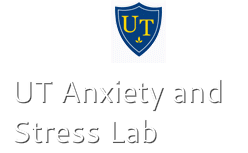Research
Listed below are some of the research areas that members of the Anxiety and Stress Lab faculty have examined, with recent examples of papers displayed.
* Papers marked with an asterisk included a student advisee co-author at the time of submission (the student's name is underlined).
Anxiety Sensitivity:
Posttraumatic Stress Disorder (PTSD):
Self-Management and Coping:
Excessive Technology Use and Anxiety:
Adolescent Anxiety:
Also, listed below are recent examples of reports conducted collaboratively by multiple faculty members (or their lab personnel) of the Anxiety and Stress Lab:
* Papers marked with an asterisk included a student advisee co-author at the time of submission (the student's name is underlined).
Anxiety Sensitivity:
- *Francis, S. E., Manley, S., & Doyle, S. (2019). A psychometric evaluation of the Revised Childhood Anxiety Index (CASI-R) in a child and adolescent sample. Journal of Psychopathology and Behavioral Assessment, 41, 677-691.
- *Francis, S. E., Noël, V. A., & Ryan, S. L. (2019). A systematic review of the factor structure of anxiety sensitivity among children: Current status and recommendations for future directions. Child & Youth Care Forum, 48, 603-632.
- *Francis, S. E., & Roemhild, E. (2021). Assessing parental cognitions about child anxiety: Are parents’ thoughts about child anxiety associated with child anxiety and anxiety sensitivity? Journal of Anxiety Disorders, 80.
- *Manley, S., Francis, S. E. (2021). The role of parental anxiety sensitivity and beliefs about child anxiety in the relationship between parent and child anxiety. Journal of Psychopathology and Behavioral Assessment, 44(1), 125–138.
Posttraumatic Stress Disorder (PTSD):
- *Durham, T. A., Byllesby, B. M., & Elhai, J. D., & Wang, L. (2022). Latent profile analysis of PTSD and dissociation, and relations with anger. Current Psychology, 41, 1595-1602.
- *Christ, N. M., Byllesby, B. M., & Elhai, J. D. (2022). The effect of cognitive-affective factors on PTSD and alcohol use symptoms: An investigation on rumination, suppression, and reappraisal. Substance Use and Misuse, 57, 2053-2062.
Self-Management and Coping:
- Na, L., Yang, L., Mezo, P. G., Liu, R. (2022) Age disparities in mental health during the COVID19 pandemic: The roles of resilience and coping. Social Science & Medicine, 305, 1-14.
- Mezo, P. G., & Elhai, J. D. (2021). Character strengths as complementary predictors of anxiety symptoms. Applied Research in Quality of Life, 16, 2173-2183.
- *Mezo, P. G., Herc, H. C., Pritchard, K. J., & Bullock, W. A. (2020). Evaluation and a proposed revision of the CAMM among underrepresented elementary school children. Assessment for Effective Intervention, 45, 235-239.
Excessive Technology Use and Anxiety:
- *Hallauer, C. J., Rooney, E. A., Billieux, J., Hall, B. J., & Elhai, J. D. (2022). Mindfulness mediates relations between anxiety with problematic smartphone use severity. Cyberpsychology: Journal of Psychosocial Research on Cyberspace, 16(1), 4.
- *Wang, Y., Yang, H., Montag, C., & Elhai, J. D. (2022). Boredom proneness and rumination mediate relationships between depression and anxiety with problematic smartphone use severity. Current Psychology, 41, 1587-1597.
- Elhai, J. D., Sapci, O., Yang, H., Amialchuk, A., Rozgonjuk, D., & Montag, C. (2021). Objectively-measured and self-reported smartphone use in relation to surface learning, procrastination, academic productivity, and psychopathology symptoms in college students. Human Behavior and Emerging Technologies, 3, 912-921.
Adolescent Anxiety:
- *Francis, S. E., & Roemhild, E. (2022). Adolescent perceptions of maternal and paternal autonomy granting and psychological control in predicting anxiety and depression. Marriage & Family Review, 58(8), 781-810.
- *Francis, S. E., Manley, S. (2022). Parental beliefs about anxiety as a mediator of parental overcontrol and adolescent anxiety. Journal of Child and Family Studies, 31, 2885-2902.
Also, listed below are recent examples of reports conducted collaboratively by multiple faculty members (or their lab personnel) of the Anxiety and Stress Lab:
- *Christ, N., Meadows, E., Armour, C., & Elhai, J. D. (2018, November). Confirmatory factor analysis of the early life experiences scale, and its relationship with anxiety, depression, and stress. Poster session presented at the 52nd Annual Meeting of the Association for Behavioral and Cognitive Therapies, Washington, DC.
- *Christ, N., Meadows, E., Charak, R., & Elhai, J. D. (2019, November). Sexual victimization in childhood and current PTSD symptoms impact on dissociative experiences. Poster session presented at the 53rd Annual Meeting of the Association for Behavioral and Cognitive Therapies, Atlanta, GA.
- *Christ, N., Meadows, M., Charak, R., Armour, C., & Elhai, J. D. (2019, November). The mediating effect of PTSD symptom severity on the relationship between childhood poly-victimization and other adverse early life experiences and anger: A path analysis. Poster session presented at the 35th Annual Meeting of the International Society for Traumatic Stress Studies, Boston, MA.
- *Christ, N., Meadows, E., Lv, X., & Elhai, J. (2018, November). The interaction of rumination and emotional suppression on the relationship between PTSD and problematic alcohol use. Poster session presented at the 34thAnnual Meeting of the International Society for Traumatic Stress Studies, Washington, DC.
- *Meadows, E., Christ, N., Charak, R., & Elhai, J. D. (2018, November). Perceptions of early life experiences and poly-victimization in childhood among trauma-exposed adults. Poster session presented at the 52nd Annual Meeting of the Association for Behavioral and Cognitive Therapies, Washington, DC.
- Mezo, P. G., & Elhai, J. D. (2021). Character strengths as complementary predictors of anxiety symptoms. Applied Research in Quality of Life, 16, 2173-2183.

